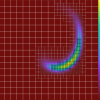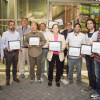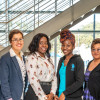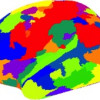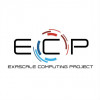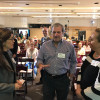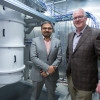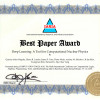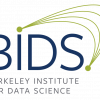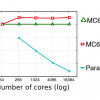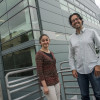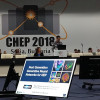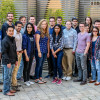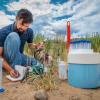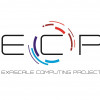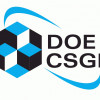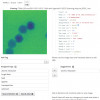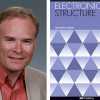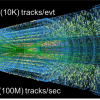News Center
SENSEI Showcased at SC18
CRD scientists at SC18 are showcasing SENSEI, a lightweight software infrastructure that enables simulations to make use of a wide array of popular in situ analysis and visualization packages. Read More »
CRD Researchers Part of Team Honored with Klaus Halbach Award
CRD staff were among the Berkeley Lab computer scientists, engineers and mathematicians recently honored with the 2018 Klaus Halbach Award for innovative instrumentation at the Advanced Light Source. Read More »
CRD Hosts Emerging Women Leaders
Researchers Ijeoma Ezika of Nigeria and Edith Mugehu of Zimbabwe spent two weeks studying biotechnology and data analytics at Berkeley Lab as part of the U.S. Department of State's TechWomen Emerging Leaders program. Read More »
HP-CONCORD Paves the Way for Scalable Machine Learning in HPC
A team of Berkeley Lab researchers has demonstrated how a new parallel algorithm called HP-CONCORD can help address some of the most challenging problems in data-driven science. Read More »
AMReX Co-Design Center Helps Five ECP Projects Hit Performance Goals
The AMReX Co-Design Center makes available a state-of-the-art AMR infrastructure with the functionality that five ECP application projects and other AMR applications use to be able to effectively take advantage of current and future architectures. Read More »
At Biden Summit, CRD's Ushizima Discusses Using Machine Learning to Improve Cancer Detection
Dani Ushizima, a staff scientist in the Computational Research Division who has adapted algorithms used in materials research to scan for cervical cancer, described her research in a panel discussion at the Sept. 21 East Bay Biden Cancer Community Summit. Read More »
Berkeley Lab to Push Quantum Information Frontiers With New Programs in Computing, Physics, Materials, and Chemistry
A series of DOE Office of Science awards, announced today, will enable Berkeley Lab to accelerate the development of quantum computing. Berkeley Lab Computing Sciences staff will play leading roles in three of the awards. Read More »
Berkeley Lab to Build Advanced Quantum Computing Testbed
The U.S. Department of Energy announced that Berkeley Lab will receive $30 million over five years to build and operate an Advanced Quantum Testbed (AQT). Researchers will use the testbed to explore superconducting quantum processors and evaluate how these emerging quantum devices can be utilized to advance scientific research. Read More »
Berkeley Lab Researchers Co-Author IARIA’s Best Paper
A paper co-authored by Berkeley Lab’s Esmond Ng and Chao Yang won best paper at this year’s International Academy, Research, and Industry Association’s (IARIA’s) Computation Tools 2018 conference in Barcelona, Spain. The paper, Deep Learning: A Tool for Computational Nuclear Physics, describes how feed-forward artificial neural networks can be used to predict the properties of atomic nuclei. Read More »
Berkeley Lab, BIDS Take on Big Data
The BIDS ecosystem comprises an impressive network of Fellows, including some who are Berkeley Lab scientists. This month, several Berkeley Lab-BIDS Fellows are organizing two of events to share their data-science expertise: Machine Learning for Science (ML4Sci) Workshop and the California Water Data Hackathon. Read More »
Exascale Computing Project Spotlights ExaGraph and STRUMPACK/SuperLU Collaboration
Results from a collaboration between the Exascale Computing Project's Sparse Solvers Software Technology project and ExaGraph Co-Design Center showed that the parallel AWPM (approximate-weight perfect matching) code can run up to 2,500x faster than the sequential algorithm on 256 nodes of NERSC's Cori supercomputer. Read More »
High School Summer Student Sanjana Shah Is 'Posit-ive' About Coding
Sanjana Shah, a high school student from the Peninsula discovered her passion for programming when she attended a coding workshop for youth sponsored by a local tech company. She is also the first (and so far, the only) high school student CRD's David Donofrio has ever hired through the Computing Sciences Summer Student program. Read More »
Berkeley Lab Researchers Showcase Deep Learning for High Energy Physics at CHEP
In a plenary talk given at the recent CHEP conference, NERSC and CRD researchers presented findings from a study in which they demonstrated how generative adversarial networks can speed simulations in high energy physics studies. Read More »
Educating for Exascale
Some 25 graduate and post-graduate students recently spent four intense days preparing for the next generation of parallel supercomputers and exascale at the Parallel Computing in Molecular Sciences (ParCompMolSci) Summer School and Workshop hosted by Berkeley Lab held August 6-9 in downtown Berkeley. Read More »
Tess Smidt, “Atomic Architect” and 2018 Luis Alvarez Fellow
To non-scientists, Tess Smidt describes herself as an “atomic architect.” And as Berkeley Lab’s 2018 Luis W. Alvarez Fellow in Computing Sciences, Smidt is designing a neural network that can automatically generate novel atomic crystal structures. Read More »
Berkeley Lab-Developed Digital Library is a Game Changer for Environmental Research
Developed by Berkeley Lab researchers, ESS-DIVE is a new digital archive that serves as a repository for hundreds of U.S. Department of Energy-funded research projects under the agency’s Environmental System Science umbrella. Read More »
New ECP Co-Design Center to Focus on Exascale Machine Learning
The Exascale Computing Project has initiated ExaLearn, a new ECP co-design center focusing on exascale machine-learning software. Berkeley Lab is one of eight national labs participating. Read More »
Univ. of Puerto Rico Team Applies Deep Learning to Structural Biology
Two students from the University of Puerto Rico Mayagüez are spending their summer in Berkeley Lab’s Computational Chemistry, Materials & Climate Group learning everything they can about deep learning and how it can improve protein structure prediction. Read More »
'Women @ The Lab' Recognizes CRD’s Ann Almgren and Daniela Ushizima
Sixteen women from various Berkeley Lab areas will be honored at the “Women @ The Lab” awards ceremony today at 3 p.m. in the Building 50 auditorium. CRD’s Ann Almgren and Daniela Ushizima will be among the honorees. Read More »
Berkeley Lab Hosts Eight CSGF Fellows in 2018
This year, Berkeley Lab will be hosting eight Computational Science Graduate Fellows. These represent some of the nation’s brightest graduate students in computational science, each pursing a PhD in a field that uses HPC to solve complex science and engineering problems. Read More »
Berkeley Lab CS Staff Play Integral Role in ISC18
Numerous Berkeley Lab Computing Sciences staff will be participating in the ISC18 conference June 24-28 in Frankfurt, Germany. Read More »
Berkeley Researchers Use Machine Learning to Search Science Data
Science Search, a web-based search engine for scientific data is currently being developed by a team of researchers in Berkeley Lab's CRD and NERSC. The team is also developing innovative machine learning tools to pull contextual information from scientific datasets and automatically generate metadata tags for each file. As a proof-of-concept, the team is working with staff at the Molecular Foundry, to demonstrate the concepts of Science Search on the images captured by the facility's instruments. Read More »
De Jong Named Electronic Structure Editor-in-Chief
CRD Senior Scientist and Group Leader Bert de Jong was recently named a founding editor-in-chief for Electronic Structure, a new Institute of Physics scholarly journal. Read More »
CRD Post-doc Goes from Medical Devices to Mars Landing
Applied mathematician Mike MacNeil joined the Computational Research Division’s Analytics and Visualization group at Berkeley Lab as a postdoctoral researcher in August 2017, where he is working to develop new algorithms that improve scientists’ ability to shift through the image data sets they glean from experiments run at Berkeley Lab’s Advanced Light Source. Read More »
Physicists and Machine Learning Experts Team Up to Tackle the TrackML Challenge
Machine learning experts, computer scientists and physicists have partnered with Kaggle on the TrackML Particle Tracking Challenge, a competition designed to inspire the development of an algorithm that can quickly reconstruct particle tracks from 3D coordinates left in silicon particle detectors following millions of particle collisions. Read More »









